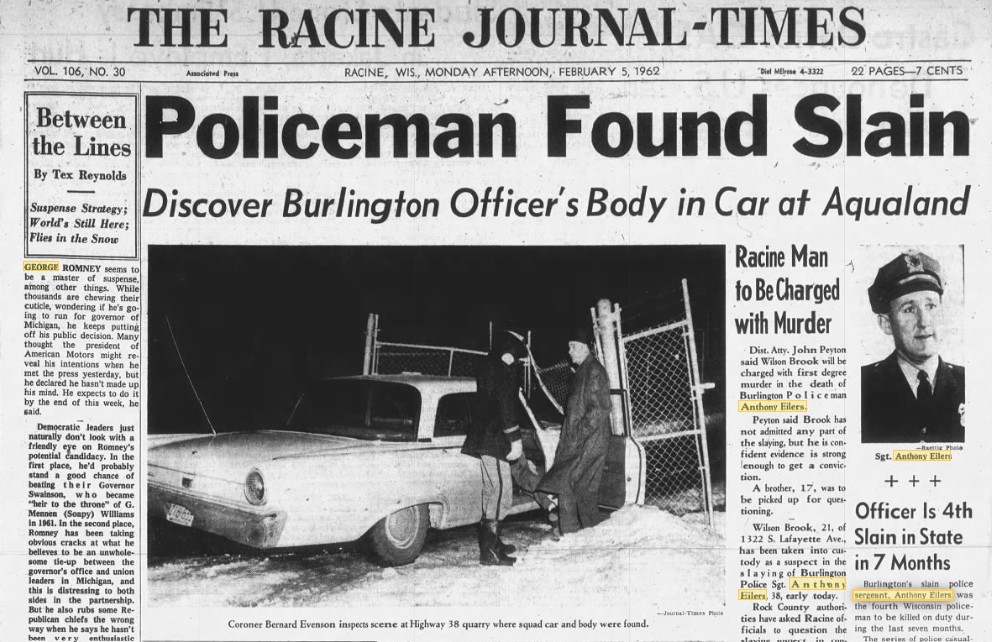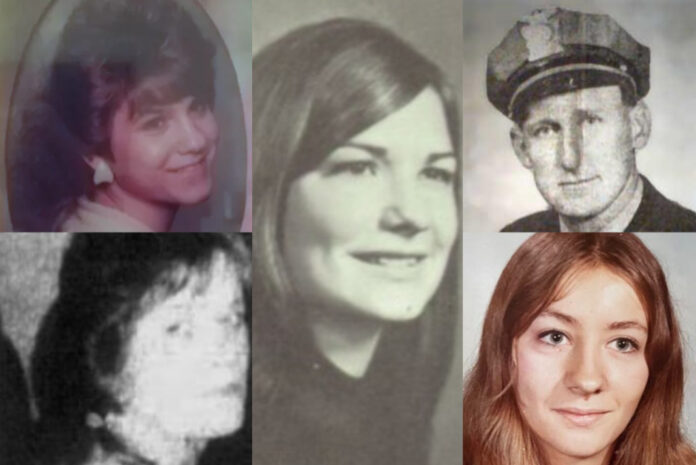State law says a “reasonable attempt” must be made to notify victims’ families of killers’ paroles. However, multiple victims’ families were not notified even though we were able to find them in a few hours.
Multiple murder victims’ families told Wisconsin Right Now that they DID NOT KNOW that Tony Evers’ Parole Commission released their loved ones’ killers on parole, including the son of a murdered Burlington police officer and the sons of a murdered and raped La Crosse County nurse.
The brother of a slain Burlington teen, who is her closest surviving kin, also did not know her killer was paroled. The daughter of a Kenosha woman murdered by her boyfriend said she learned about the parole a year after the fact.
The failure to notify victims’ family members echoes the reason Gov. Tony Evers gave for belatedly urging his Parole Commission chairman to successfully rescind the parole last spring of convicted wife killer Douglas Balsewicz, whose daughter was not notified. At that time, Evers emphasized that victims need to be given a voice in parole decisions, writing, “Justice simply demands it. Our constitution states that victims have a right to heard.”
However, on these cases, he has remained silent, even though some of the paroles occurred before he reappointed chairman John Tate, who stepped down at Evers’ request after intense media and family pressure in the Balsewicz case.
We’ve found a pattern of systemic failure to notify victims in a series of parole cases that are as serious as the Balsewicz crime; these are some of the most brutal murders and rapes in state history.
State law, in homicide and some other offenses, says that the state “shall make a reasonable attempt to notify all of the following persons, if they can be found,” referring to family members of victims. Yet Wisconsin Right Now was able to find the family members who were not notified in a few hours. They were shocked to learn about the paroles from us, and, in some cases, deeply traumatized by it.

The systemic lack of notification has revealed deep flaws in the way the state of Wisconsin alerts families to looming and granted paroles. The Wisconsin Parole Commission states, “Victims enrolled with the OVSP’s DOC NOTIS information and notification system will receive notice about the offender’s upcoming parole interview. This notice is typically sent two months before the scheduled parole interview.” However, most of the victims’ families we spoke with did not even know that this system existed.
The governor did not respond to requests for comment on the paroles or the lack of notification to the victims’ families. We also received no response from AG Josh Kaul and Lt. Gov. Mandela Barnes. We asked all three whether they condemn the paroles. We asked them whether they think the victim notification system should be changed. Complete silence. We also asked the Parole Commission about victim notification in these cases. No response.
“I was shocked he got out,” Patricia Logan, the daughter of murder victim Christine Acevedo, told Wisconsin Right Now of her mother’s killer James Block, who is living in Kenosha. She did not learn about James Block’s parole until a year after he was already released. She called the system and found out about it, but it was way too late to try to stop it.
“I never received anything,” she said of notification about the parole hearing or release. “I called and found out he was out a year. I was beside myself.” She said the information ignited severe PTSD trauma within her.
Other family members expressed shock to learn that the inmates were paroled when contacted by Wisconsin Right Now. They said they had no idea until we told them.

Both Tim and Andrew Erickson learned that their mother Susan’s killer and rapist Terrance Shaw was paroled in 2021 through a call from Wisconsin Right Now over the weekend.
They had no idea he was out, living 2.6 miles from the murder scene in Onalaska, and the news has turned their lives upside down.
“This is all such a jarring surprise,” said Susan’s son Tim Erickson, who was 3-years-old when his mother died. “It seems so absurd that he would get out. I thought that guy would die in prison for sure.”
“I didn’t even know this is the way things worked,” he said.
Andrew Erickson said, “I am pretty shocked. I guess I wish I had been informed. I don’t know anybody who knows the whole thing who ever thought he should be released. It’s crazy. It makes no sense. Thousands of people are more qualified for release.”

Like the others, Tim Erickson is a very thoughtful person with a nuanced intellect. He believes that the state should work to more proactively reach victims’ families, and he believes state grief counselors should be provided to assist them through the parole process. Erickson made it clear his comments aren’t political; in fact, he voted for Evers, but he believes the notification and release policies are “horrible,” and he would like change to result so other victims’ families don’t endure similar trauma (We will be telling his story in full in a future story.) Tim also said he believes in some prison reform too, just not for people like his mother’s killer, an intentional murderer and rapist.
Republicans in the state Senate let Evers’ nominations of Parole Commission Chairman John Tate in 2019 and 2021 dangle without a vote, allowing him to continue to serve. Tate quit at Evers’ request last spring as the Balsewicz story provoked major headlines throughout the state and just a couple days after Wisconsin Right Now filed an open records request on the parole releases of two people convicted in connection with the murders of Milwaukee police officers.
In the Balsewicz case, although some victims’ family members were not notified, others were, and they were able to pressure the state to rescind the parole before the convicted wife killer walked out of the prison doors. However, that case is now in the administrative law process because Balsewicz had a right to appeal. Tate rescinded the parole, citing the concerns raised about victim “input.”
However, none of that is the case with these other families. They say no one was notified in the family at all. And the killers were already released, in some cases for years.
The administrative code that allows the Parole Commission chairman to rescind a release refers to changes of circumstance discovered before the inmate has been released.
Evers expressed great public concern about Balsewicz’s parole:
.@GovEvers "implores" the head of his parole commission to reconsider the parole of Douglas Balsewicz who was scheduled to be released next week. Here's the letter sent today. pic.twitter.com/RgBM5mCNwH
— Will Kenneally (@willkenneally) May 13, 2022
However, the other victims’ families’ stories are eerily similar to the Balsewicz case when it comes to lack of notification and the murders are just as brutal and severe.

Why the difference in response? One case receives outrage, the others silence?
“I have considerable concerns regarding whether Johanna’s family was afforded sufficient opportunity to voice their memories,” Evers wrote, referring to the Balsewicz case last spring. (We would note that the other victims’ families also were not afforded sufficient opportunity to voice their memories).
He added, “I also believe, however, and Wisconsin state law agrees, that the voices, experiences and trauma of victims of crimes must weigh heavily in these conversations and deserve full and meaningful consideration. Justice simply demands it. Our constitution states that victims have a right to heard.”
Continued Evers: “Our statutes reiterate that victims have the right to provide direct input in the parole decision-making process. Section PAC 1.07(7) of the Wisconsin Administrative Code provides that you can rescind your decision where there has been a change in circumstances.”
“Among the factors that must be considered is whether the questions raised regarding the appropriate level of victim notification and opportunity for input – especially given the extremely violent nature of the offense and relative recency – constitutes a change of circumstances justifying recission at this time.”
In fact, Wisconsin Right Now has yet to find a family member who WAS notified by the state in a timely manner either that parole was possible or that the killer was freed. Furthermore, the paroles in many cases did not receive any coverage from the news media when they occurred between 2019 and 2021, so family members did not find out that way, either.
Evers’ Parole Commission has released hundreds of convicted criminals, freeing them early on parole mostly into Wisconsin communities, including more than 270 murderers and attempted murderers, and more than 44 child rapists.
“A victim has a right to attend a parole interview per s. 304.06(1)(eg) Wis. Stats. Attendance can be in person, by telephone or by videoconference. Victims are never required to attend a parole interview. It is the choice of each individual victim whether or not to attend. If a victim chooses to attend a hearing, a victim advocate from the OVSP will accompany the victim throughout the entire process,” the Parole Commission website states.
Lack of Notification Cases
Slain Burlington police Sgt. Anthony Eilers’ son was among those family members who expressed shock. He learned from Wisconsin Right Now a few days ago that cop killer Wilson Brook was granted parole in 2019, according to Parole Commission records.
The case was horrific and a massive story at the time; newspaper articles from the time show that Brook shot Eilers five times in a routine traffic stop before trying to drive his squad car, with the officer’s brutalized body inside, off a cliff. Eilers was a World War II veteran and married father of two. Brook has since died, the Department of Corrections confirmed; however, a family obituary shows that Brook lived through at least July 30, 2021, with the Parole Commission records indicating parole was granted in 2019. We asked the Parole Commission and Department of Corrections when he died with no response.

John Eilers, the officer’s son, told Wisconsin Right Now in an interview that he did not even know Brook was paroled, and he believes that cop killers should never be paroled – including Brook.
“No, give them life in prison,” he said. “That’s not right.”
In some cases, victims’ families are often very traumatized and frayed over the years. Years later, mothers and fathers who religiously attended Parole hearings have died. PTSD has caused decades of trauma.
Tim Erickson said their grandmother kept the torch up to keep the killer behind bars for years but she long ago died. Susan’s husband, their father, has passed away, leaving the two brothers as her closest next of kin. Tim says he wishes he had known that his mother’s killer Terrance Shaw was coming up for parole, and he’s outraged by the release.
“It defies logic. I don’t understand why this guy gets a chance to even finish out a life outside prison,” he says. “A potential serial killer gets let go.”
The murder was horrific. Shaw glimpsed Susan Erickson, a stranger to him, through a picture window, broke in, raped, strangled, and stabbed her to death. Shaw was captured a year after the murder prowling outside another med tech’s Onalaska home with meat hooks and rubber shoes.
Also not notified: The brother of a pregnant teen named Cathy Ziebell, who was thrown off a bridge in Burlington, Wisconsin.

“I think it’s terrible,” Ray Ziebell said of Mark Ketterhagen’s parole. “Society is breaking down.”
Ketterhagen murdered Ray’s 16-year-old pregnant sister Cathy Ziebell, throwing her off a bridge into the Fox River. He was paroled in 2019, but Ziebell also found out from Wisconsin Right Now that Ketterhagen was released – for the second time. Ketterhagen had been paroled in 1990 for the first time, but he was such a failure that he was sent back behind bars, only to be released again.
Ziebell said he didn’t know that Ketterhagen was paroled again until Wisconsin Right Now called and told him.
“If people like Evers keep letting these people out, there will be more murders and more suffering, and then none of us are safe,” said Ziebell. Unlike pardons, Evers does not have the power to grant paroles, but, as noted, he twice appointed the Parole Commission chairman who did. He reappointed Tate AFTER Ketterhagen’s release, saying he was pleased to do so. And the governor demonstrated in the Balsewicz case that he has the power to do SOMETHING by speaking out and using his moral authority and bully pulpit to help families.
“Where was justice?” Ziebell asked.
Christine Acevedo’s daughter acknowledges the Parole Commission may have had old contact information for her, but Wisconsin Right Now was able to find her in an hour.
“I was shocked he got out,” Logan told Wisconsin Right Now. “Life is life. You took a life, you don’t get to breathe fresh air. My mother doesn’t get to breathe fresh air; why should he?”
She believes Gov. Evers should not have appointed a Parole Commission chairman with this early release philosophy. “He (Evers) did not look at the full picture of what families go through,” she said, describing Block’s release as incredibly “traumatic.”
Table of Contents











![Governor Caught Playing Politics with Brillion Residents’ Lives & Livelihood [COLUMN] ron tusler](https://www.wisconsinrightnow.com/wp-content/uploads/2025/07/MixCollage-15-Jul-2025-03-35-PM-9568-218x150.jpg)



![Protecting Portland: No Good Deed Goes Unpunished [REVIEW]](https://www.wisconsinrightnow.com/wp-content/uploads/2025/07/portland-218x150.jpg)






